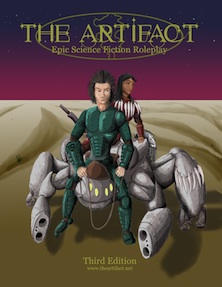 You’ve probably heard people talking about how to best handle the illusion of risk in a game. First there is the risk of a PC death (in some games), then there is the risk of loosing resources that motivate the players to stand up to challenges. Unfortunately this isn’t really what is going on. If the players were worried about risking their character’s lives or resources they’d just say “No thank you” to that story of gold locked up in that tower. The fact is, players are not motivated by risk, they are motivated in spite of it. If any of the players were motivated by a sense of risk they’d spend the whole game building bunkers and never leave.
You’ve probably heard people talking about how to best handle the illusion of risk in a game. First there is the risk of a PC death (in some games), then there is the risk of loosing resources that motivate the players to stand up to challenges. Unfortunately this isn’t really what is going on. If the players were worried about risking their character’s lives or resources they’d just say “No thank you” to that story of gold locked up in that tower. The fact is, players are not motivated by risk, they are motivated in spite of it. If any of the players were motivated by a sense of risk they’d spend the whole game building bunkers and never leave.
Why RPGs Arn’t About Risk
Loss Psychology
The human brain works in really odd ways, if the average joe is handed two ten dollar bills and told they can keep them if they win a coin toss and then are told they have to give back ten dollars if they refuse the coin toss, the majority will choose the coin toss. Rationally that doesn’t make sense, you can have a free ten dollar bill or the fifty percent chance at a higher reward, the ten dollars is the sure bet. Unfortunately for humans, the moment they’ve touched those bills handing it back feels like you’ve lost ten dollars even though you’ve gained ten dollars.
There you have, in your hand, a character sheet with trappings galore. What do you really have? In a strange way, a social currency. One that allows you to do certain things in a specific social circle that they would not allow you to do if you did not have that character sheet. So in a way, that sheet is like money, social money.
“Wait, wait” you may say, “Doesn’t that mean that if I loose my character I stand an actual risk? Weren’t you just saying RPGs aren’t about risk?” Yes, and yes. The player does stand an actual social risk when putting their ‘currency’ (character) in danger and yes, that’s not what the RPG is about.
The game is about the GM introducing something that the character can have if they perform certain actions. This can be in game money, experience, prestige or even a place to exist if their home or world is threatened. The players instantly imagine what the characters can do with that something, even if it’s just a vague idea of being richer or having more XP. The players now feel as if that reward is already theirs, the performance of various feats is psychologically how they get back what was subconsciously thought of as already theirs.
You may feel that you aren’t influenced by that kind of thinking and it’s possible that on occasion you’re not. You don’t buy into the image of already having that reward but most adults go to work expecting to get a paycheck periodically. When someone looses their job, they feel profound loss even if they get paid in full for all the work they’ve done. In a way this is slightly irrational, you are subconsciously expecting those future earnings even while consciously acknowledging that most jobs will not last forever.
Loss And Risk – What’s The Diff?
So if an RPG is about loss, isn’t that risk? In a way yes but it’s significant to make the distinction because most writers are saying that the players are motivated by the desire to not lose what they already have when in reality they are motivated by the sense that they will lose what, in most cases, they haven’t gotten yet. This is important to creating a compelling story instead of the feeling that the characters are being beat on unfairly. If a GM thinks their job is to risk the character’s lives or resources the players may be engaged for a while but they will quickly tire of it. However, if the GM understands that their job is to get the players to aspire to more and then challenge them to get there, the players interest will be stimulated.
So No Risk?
Risk is still a factor, a necessary one, but it isn’t the motivation. With no risk there’s no point to playing but it’s important to keep risk in it’s place. Loss psychology motivates the players to act to get what they imagine themselves to have. Risk is what that motivation has to overcome. No risk and there is nothing to overcome, no loss and there’s no reason to overcome.
Filed under GM Advice


 The Free RPG Blog
The Free RPG Blog
I want to point out that characters represent another kind of value, and one that also has its own peculiar psychology. A character represents a sunk cost of time. It took time to create the character. The character’s history in the campaign took time to build. Once the character is dead, all of that built value is lost.
The strange choices that result from people wanting to recoup sunk costs has been in several articles over the last couple of years. It’s worth some reading, if only to take a hard look at your own motivations.
Another interesting element to this is the nature of random reinforcement. Behavioral psychologists learned long ago that random reinforcement of behavior inexplicably creates a stronger response than constant reinforcement. Gaming certainly provides random reinforcement.
All in all, this is a great article. I’d be interested to see you expand on it.
I agree completely that characters represent an actual value to the player. I think that the character is a kind of social currency that allows you to buy a certain amount of status in the gaming group.
The point you make about random reinforcement is great. There are other odd results that come from random reinforcement like players thinking they can influence die rolls. Random reinforcement causes the subject to believe that repeating whatever behavior they engaged in before the reinforcement will yield more reward. This happens even if they know the reward was random (as in throwing a die). I think that would be a really deep rabbit hole to go down when it comes to RPGs. I’ll think about it and see if I can address it in a cogent way.